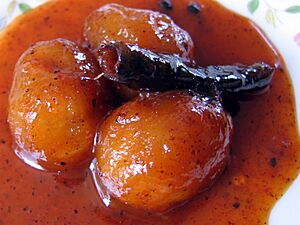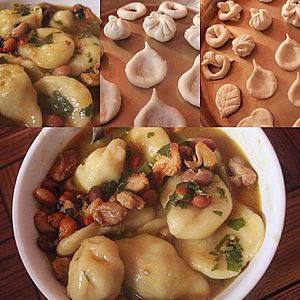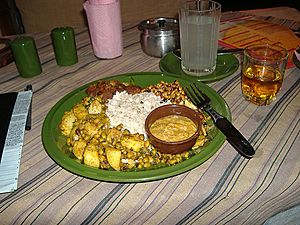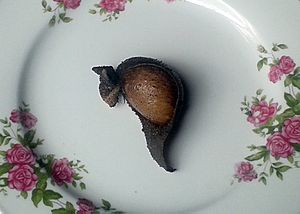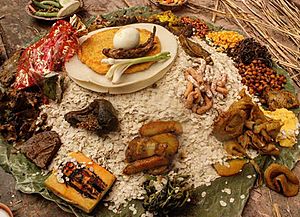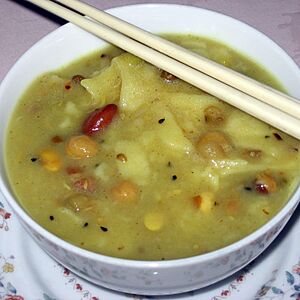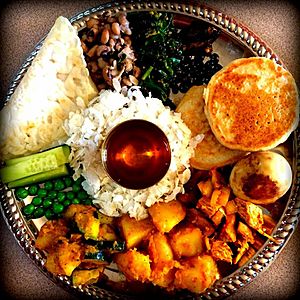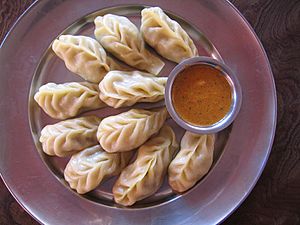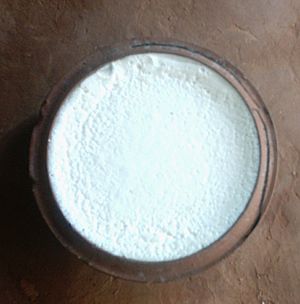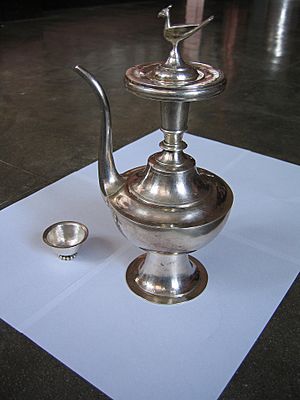Newa cuisine facts for kids
Newa cuisine (also called Newar cuisine) is a special type of food from Nepal. It comes from the Newars who live in Kathmandu. Kathmandu is known as Yen in their language, Nepal Bhasa. This food style has grown over many centuries.
Newa cuisine is very famous in Nepal. It has more than 200 different dishes! It's often more fancy than other Nepalese cuisines. This is because the Kathmandu Valley has very rich soil. This soil is great for growing lots of fresh food. Also, many families there were wealthy. This made growing fresh produce more helpful than just growing rice. Food is a big part of Newar culture. Different foods are made for different events. They think about the weather and what the body needs. Newars are well-known for their amazing feasts. The dishes served at these parties and festivals often have special meanings.
Contents
What's for Lunch and Dinner?
When Newar people have lunch or dinner, they often eat:
- Jā (boiled rice)
Meat Dishes for Meals
Newar cuisine has many meat dishes. Here are some popular ones:
- Choila (ground buffalo meat)
- Pālulā (buffalo meat and ginger curry)
- Senlāmu (raw ground buffalo liver with spices)
Vegetable Dishes for Meals
There are also many delicious vegetable dishes:
- Tarkāri (vegetable curry)
- Wāunchā (green vegetables)
- Tukan:chā
- Palācha
- Shākechā
- Chōlechā
Soups for Meals
Soups are also a part of meals. They include:
- Ken (lentil soup)
- Simi (beans)
- Mi (fenugreek)
- Aai ka (leftover rice from making rice beer)
- Choohon (bamboo shoot soup)
Relishes for Meals
Relishes add extra flavor to meals:
- losa (a type of relish)
What's for Lunch?
Lunch often includes lighter foods or snacks. Here are some common lunch items:
- Baji (beaten rice)
- Chatānmari (a thin rice flour crepe)
- Chhusyā (parched wheat)
- Gophuki (puffed rice)
- Gwaramari (deep-fried dough)
- Hājā (steamed rice)
- Jākimari (rice flour pancake)
- Kani (popcorn)
- Kheyn wo (fried egg)
- Musyā (roasted soybean)
- Sukulā (dried meat)
- Wo (fried lentil cake)
- Bara (a fried lentil cake, shaped like a donut)
Feast Foods
Newar feasts are famous for having many special dishes. These are often served at big celebrations.
Meat Dishes for Feasts
Feasts feature a wide range of meat dishes:
- Dāyekālā (buffalo meat curry)
- Dugulā (goat meat curry)
- Heynlā (duck curry)
- Bandella (wild boar meat)
- Changrala (mountain goat meat)
- Khasilā (gelding goat meat)
- Nyā (fish curry)
- Sanya (small fish)
- Chohi (steamed buffalo blood)
- Janlā (marinated raw diced meat with skin)
- Kachilā (marinated raw minced buffalo meat)
- Khāyālā (chicken curry)
- Me (buffalo tongue, boiled, sliced, and fried)
- Pangra
- Nhyapu (brains, boiled, sliced, and fried)
- Nyāpukā (fried fish)
- Pukālā (fried meat like intestines, liver, and heart)
- Sanyā-khunā (spicy jellied fish soup)
- Sapu mhichā (a leaf tripe bag filled with bone marrow)
- Swan pukā (goat lungs filled with batter, boiled, sliced, and fried)
- Takhā (jellied buffalo meat curry)
Vegetable Dishes for Feasts
Vegetable dishes are also important at feasts:
- Buba kwā (beans curry)
- Chhon kwā (curry of bamboo shoots and potato)
- Kwāti (a soup made from nine types of sprouted beans)
- Mee kwā (curry of fenugreek seeds)
- Pancha kwā (a mixed vegetable curry with bamboo shoots, potato, dried mushroom, dried radish, and black-eyed peas)
Soups for Feasts
Special soups are also served at feasts:
- Bullā or ka kwā (soup made from rice beer dregs, diced spleen, other meats, bone marrow, and bone)
- Chhyāllā (soup made from shredded pickled radish and diced variety meats)
- Pāun kwā (sour soup made from Himalayan hog plum)
Festival Foods
Some foods are specially made for festivals:
- Samaybaji (a set meal with beaten rice, roasted meat, vegetables, cowpea, soybean, and ginger)
- Syābaji (parched rice)
Meat Dishes for Festivals
Festival meat dishes include:
- Chhoylā (buffalo meat, either boiled or smoked, sliced, and marinated)
- Ghalmal (a mixed curry of diced lentil cake, green vegetables, and leftover meat, seasoned with Nepal pepper)
- Hāku Chhoylā (roasted, diced, and marinated black buffalo meat)
- Momochā (dumplings filled with minced buffalo or chicken meat)
- Kunyā (smoked fish)
Vegetable Dishes for Festivals
Festival vegetable dishes are:
- Chākuhi (boiled sweet potato)
- Hāku Musyā (roasted black soybean mixed with oil and salt)
- Lābhā (chopped garlic greens mixed with spices)
- Pālu (diced raw ginger)
Salads
Newar cuisine also has fresh salads:
- Kaywu (soaked field pea and garden pea)
- Lain (sliced radish)
- Tusi (sliced cucumber)
- laaie (sliced radish)
Desserts
For something sweet, Newar cuisine offers:
- Dhau (yogurt)
- Juju Dhau (a special yogurt from Bhaktapur)
- Marichari (can be anything sweet, from soft milk pastries to fried bread dipped in caramel)
- Laakhamari (made from flour and sugar, cooked in hot oil)
- Guulmari (made from flour and sugar, cooked in hot oil)
- Baalbara
- Yomari (made from chaku, a sweet paste, and flour, steamed like momo)
- Anarsha
- Ainthe-Mari
- Khajuri
- Roowth
- Fini
- Nimki
- Lakshmimari
- Swaari
- Malpha
- Jeeri
- Gud-Paak
- Chimti
- Aiti Mari
Traditional Drinks
Traditional Newar drinks include:
- Aylā (a traditional drink)
- Arak (a rice-based drink)
- kaar-Thwon (brown beer)
- hyam-Thwon (red beer)
Cooking Tools and How They Eat
Newar people use special containers and tools for cooking, storing, and serving food. These are made from gold, silver, copper, brass, iron, clay pottery, dried rice stalks, corn leaves, and even tree leaves sewn together. They eat food with their bare hands. It's a custom to wash hands before and after every meal.
Here are some of their traditional utensils:
- Anti (a jar for drinks)
- Bātā (a basin)
- Chupi (a knife)
- Dhampo (a water pot)
- Hāsā (a round tray for winnowing)
- Karuwā (a water jug)
- Kholā (a bowl)
- Sali (a small clay bowl)
- Somā (an earthen pitcher for drinks)
 | Percy Lavon Julian |
 | Katherine Johnson |
 | George Washington Carver |
 | Annie Easley |


